Hey everybody! Avengers: Infinity War is just about to come out in a little over a month, and tickets are on sale over at your favorite theater right now, most likely (they are at mine anyway). So with that, here’s the newest trailer for the big culmination of everything Marvel Studios has been working on for the past 10 years…and while I’m about as jaded about these things as anybody can be, it’s hard to not get a little excited at the sheer cavalcade and spectacle on display here:
It looks like they’re going to cover a lot of needed ground with Thanos, something I’m pretty thankful for, as the previous films have done an admittedly terrible job building to this threat. He actually seems like a scary bad guy here! Also, is it possible? Will we have the rare Marvel movie with a good, memorable score?
Bring it on. Though if they pull this one off, I have no idea how they top it…unless of course the X-Men/Fantastic Four integration is next on the docket.
And just to add one more item, here is the very crowded new poster.


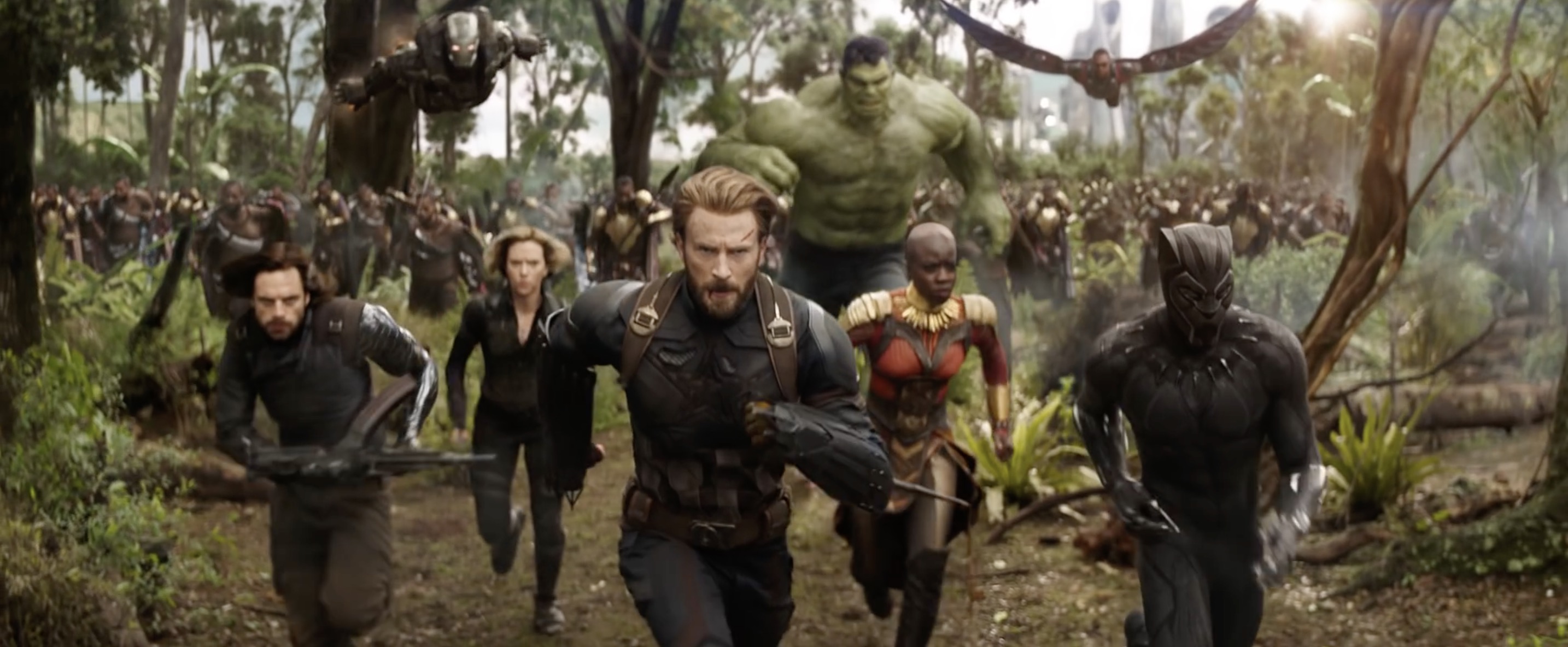
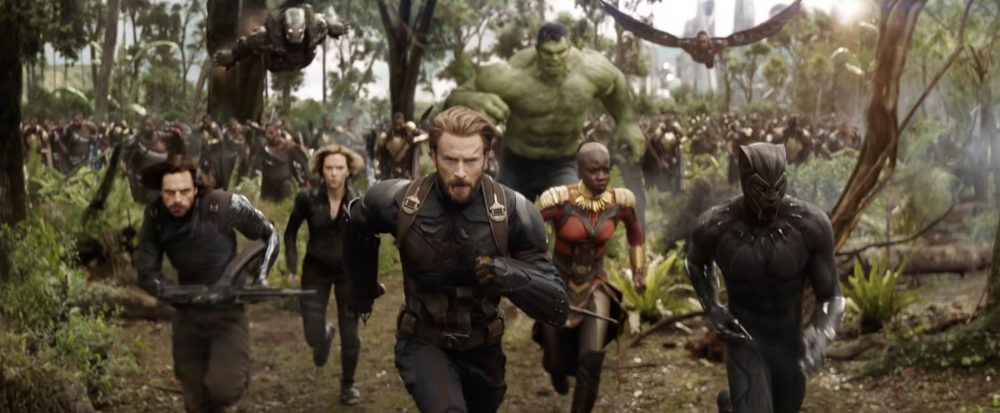
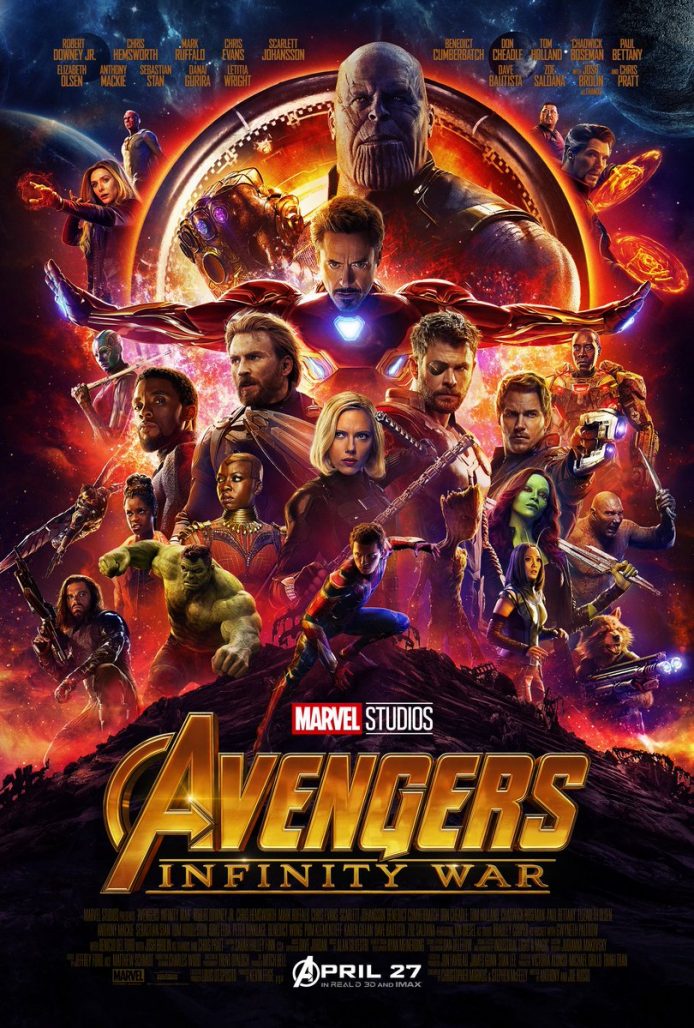
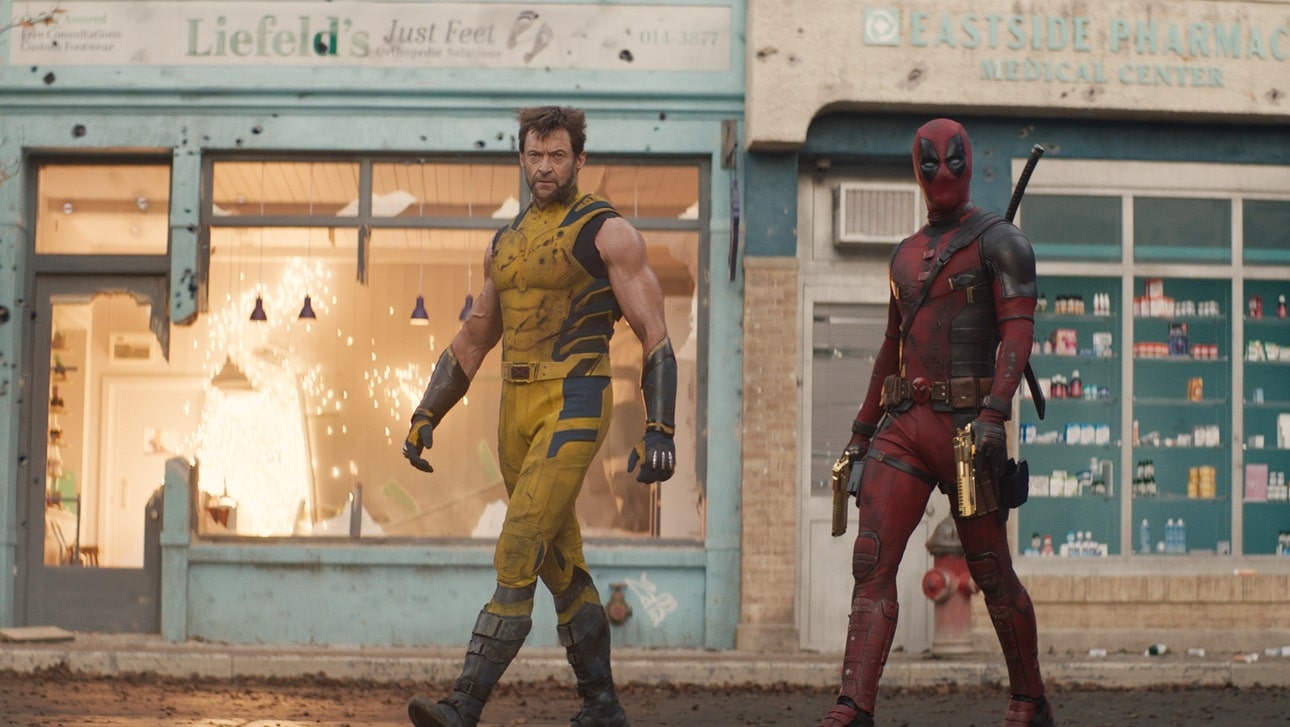
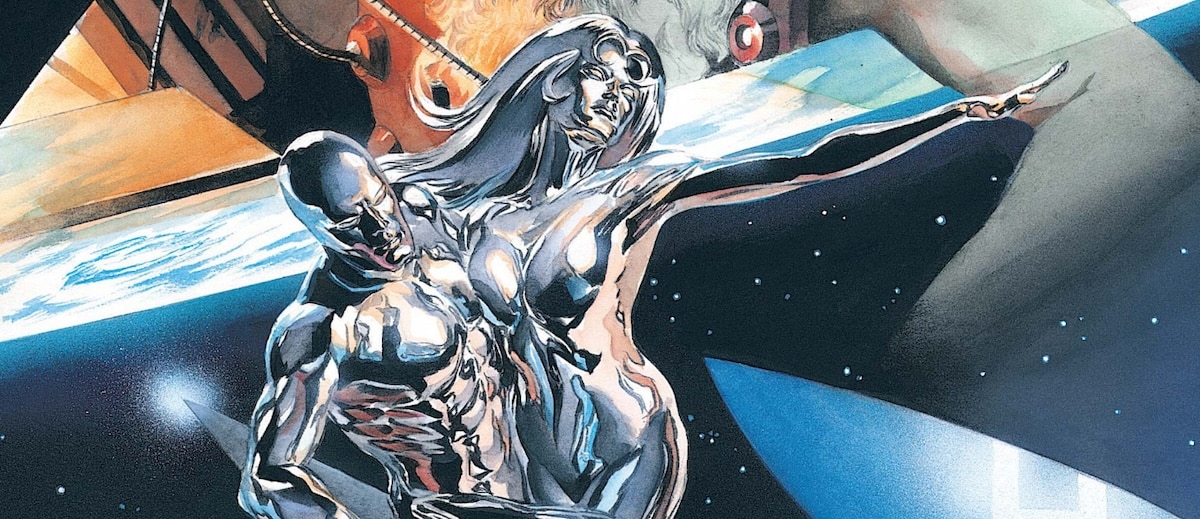
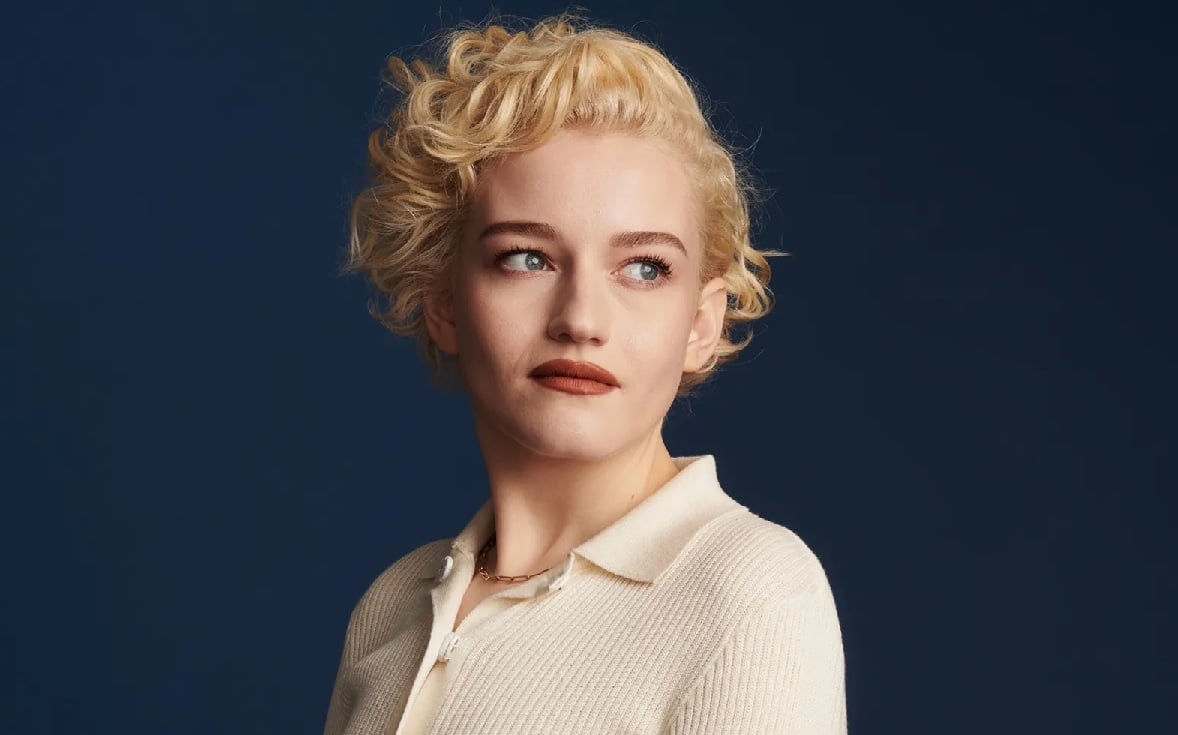


Its hard to get excited when it looks like transformers or Age of Ultron
Like every other Marvel movie it looks fine, albeit lacking in any emotional weight, narrative consequences, or visual distinction.
It’s the 21st century equivalent of an MGM musical: Extremely on-brand, low in ambitions, indistinguishable from its predecessors, and likely forgettable within 24 hours of seeing it. None of this is bad. It’s just the very definition of mediocre. It’s what Disney does best: A comfortable sameness that comforts but never challenges the audience.
People will probably view this comment as damning. It’s not. I just want to see films that try harder.
I don’t know how someone can see Black Panther or Civil War and say they lack any emotional weight, or Ragnarok and cite how there are no narrative consequences. Also, a comfortable sameness…isn’t that American superheroes in general? I mean, if you want challenging filmmaking, I don’t think this is the genre for you.
Yes, those terrible, forgotten MGM musicals like Singin’ in the Rain, Meet Me In St. Louis, Victor/Victoria, An American In Paris…
I don’t even necessarily disagree with you about Disney’s general philosophy, but man, that’s an example that doesn’t really help your point. Unless your point is, “The studio system exists to churn out profitable, unchallenging versions of whatever is popular, but is nevertheless capable of producing truly great and enduring works of art thanks to the creative talents of the teams behind them, and that this process – of artists leaving a personal stamp on cash-seeking corporate schlock – is literally where auteur theory originated.”
But I don’t feel like that’s what you were trying to say.
Daniel really likes the DC movies. That should inform where he’s coming from.
“Singin’ in the Rain, Meet Me In St. Louis, Victor/Victoria, An American In Paris”
Remove the nostalgia element and I honestly don’t think there’s anything all that great about any of those films (excluding “Victor/Victoria” which I haven’t seen all the way through so I can’t comment on, but which also seems like an odd addition to include since it is separated by 30 years from all the others). The dancing is spectacular in the two Gene Kelly films, but as cinema there’s nothing that elevates them. The camera work is pedestrian, the performances are hammy, the stories are entirely superficial, and the song lyrics are mostly banal.
And this has nothing to do with the era in which they were created either. Compare them to Hitchcock films of the same time period and they look even worse. And as musicals, compare them to the work of Stephen Sondheim and their superficiality stands out even more.
None of this means they’re not entertaining. None of this means one can’t enjoy them (I enjoy them). But to hold them up as pinnacles of the cinematic art form just doesn’t hold water for me.
But even accepting your argument that they are great films, MGM produced hundreds of musicals. If three stand out as great, that’s not a very good track record. Again, compare that to just Alfred Hitchcock who made 50-ish films and at least a dozen are great.
“Daniel really likes the DC movies. That should inform where he’s coming from.”
I think the two best super-hero films, the ones that really took chances and pushed the envelope of both the genre and the medium were “X2” (2003) and “Batman v Superman” (2016). That’s the metric that I’m judging these films by. Do I have a bias towards DC films? Yes in that I like their films more because I think they consistently make better films. But I also call them out when they make terrible films (“Justice League,” “Suicide Squad,” “Green Lantern,” the Schumacher “Batman” films, “Superman IV”). So I think I evaluate them fairly by the consistent standards that I hold them to. DC hits more home runs, but they also strike out more. Marvel mostly just hits singles or bunts. Which, again, is fine.
What I do have a genuine bias toward is a more serious, darker, more melancholy approach to this material. I’m just naturally drawn to that approach. But that doesn’t mean that I don’t like films that take a different approach. I think “Spider-Man 2” is one of the best super-hero movies ever made despite personally not being drawn to that goofier approach in most instances. Of the MCU films, I would actually rate “Iron Man,” “Iron Man 2,” Captain America,” “The Avengers,” “Winter Soldier,” “Age of Ultron,” and “Civil War” as their best (again, despite having a preference for darker material). But even of those, the best of that bunch was “Winter Soldier” and I’d only rate that a B+. The others on that list are solid B’s. Again, not bad films. Not great films. Just barely above average. And I think that if the best you’re producing is “barely above average,” that’s a pretty low bar to aim for. Again, there’s nothing wrong with it. But there’s also nothing to celebrate about it.
>>>>“Singin’ in the Rain, Meet Me In St. Louis, Victor/Victoria, An American In Paris”
>>>>Remove the nostalgia element and I honestly don’t think there’s anything all that great about any of those films
Stopped reading after that.
I got four words for you. Judy Holliday. Cyd Charisse.
Cinema is about story but also about exploring the human experience. Singing and dancing is an integral part of that experience (just watch any two year old to prove that) and capturing it with joy and beauty is as important a thing as cinema can do.
Superhero movies are today’s westerns. There is a formula and a good v evil dichotomy. The western outgrew its serial origins to make powerful statements. The Searchers, Shane, John Ford in general, on to Sergio Leone, Butch Cassidy, and then….times changed.
With Logan you have a pretty clear reference to Shane. Other superhero movies are also moving to grow up a little. Wonder Woman and Black Panther are steps in that direction.
what a doofus
Daniel, you have awful taste in art and entertainment if you really feel that way about Singin’ in the Rain, Meet Me in St. Louis, and An American in Paris. (I also haven’t seen Victor/Victoria all the way through.) Are The Wizard of Oz, On the Town, and The Band Wagon also on your hate list?
I agree with you about the greatness of Hitchcock. You should also explore the work of MGM director Vincente Minnelli, who was to the musical what Hitchcock was to the thriller.
If superhero movies are the new Westerns, where is the genre’s John Ford? Or even the Howard Hawks, Sam Peckinpah or Sergio Leone? It’s hard for a directorial voice to emerge in superhero flicks, because they’re about corporate-owned characters and are made by committee.
And they rarely take chances (or risk alienating the audience) because so much money is at stake. Logan was one of the few movies to take chances.
Tim Burton and Sam Raimi certainly brought unique styles to their comics-based movies, but that was long ago. Who knows, maybe Ryan Coogler will emerge as the John Ford of superhero movies — although after just one Marvel movie, it’s too soon to tell.
“Daniel, you have awful taste in art and entertainment if you really feel that way about Singin’ in the Rain, Meet Me in St. Louis, and An American in Paris. (I also haven’t seen Victor/Victoria all the way through.) Are The Wizard of Oz, On the Town, and The Band Wagon also on your hate list?”
Good to hear. Now tell me where I said that I hated those films. I said that they weren’t great films. But I pointedly and repeatedly said that I enjoyed them. How does that equate to hate?
What I’m arguing for is standards. And with standards, I’m arguing for ambition. Too many people give super-hero movies a pass for being “just good enough.” I’m arguing for more.
The ones that I think pushed the envelope:
Batman Returns (1992)
X2 (2003)
Spider-Man 2 (2004)
The Dark Knight Trilogy (2005 – 12)
Superman Returns (2006)
Man of Steel (2013)
Batman v Superman (2016)
I think in each of the films above the filmmakers took chances, didn’t play it safe, and pushed the genre into territory that, in many cases, unsettled some audiences and led to divisive opinions.
Who is the John Ford of super-hero films? By my list I would argue Bryan Singer, Christopher Nolan, and Zack Snyder. Tim Burton and Sam Raimi are on the cusp.
“Stopped reading after that.”
Good to know you’re willing to engage with opinions that differ from yours.
“I got four words for you. Judy Holliday. Cyd Charisse.”
Hmm. That parallels my celebration of Gene Kelly as an amazing dancer. Being great in a musical does not equate to a musical being a great film. Morgan Freeman was celebrated in 1987 for his performance in “Street Smart,” a film which I have not seen so I can’t offer my own opinion but which is universally dismissed as a terrible movie. Does it being a terrible movie make Freeman’s performance bad? No. Does Freeman’s great performance make “Street Smart” a great film? No. Intelligent people are able to make distinctions.
“what a doofus”
Thank your for your enlightened feedback.
“I don’t know how someone can see Black Panther or Civil War and say they lack any emotional weight, or Ragnarok and cite how there are no narrative consequences.”
Haven’t seen Black Panther or Ragnarok yet mostly because the previous MCU films haven’t impressed me enough to make the effort to watch them yet.
I liked “Civil War” quite a bit. It was on my list above in an earlier comment of the MCU films that I like. But emotional weight? My main problem with the film is that the two lead characters changed their entire world view on a dime in that film from how they had been presented in the previous films simply because the plot mechanics demanded it. For me, that makes it difficult to get emotionally engaged when the characters and their motivations were so transparently arbitrary and malleable at the whims of screenwriter willing to ignore that which came before.
“Also, a comfortable sameness…isn’t that American superheroes in general?”
Again, that’s the argument that I’m trying to make. Yes, most super-hero movies, particularly the most popular MCU films, are that. But the ones I listed above are not. I want more of that. The genre is clearly capable of achieving it. It just takes ambition.
“Cinema is about story but also about exploring the human experience. Singing and dancing is an integral part of that experience (just watch any two year old to prove that) and capturing it with joy and beauty is as important a thing as cinema can do.”
Singing and dancing are distinct art forms. Can they successfully be integrated into great films? Yes. I’d argue that “Fiddler on the Roof” (1971) is a legitimately great film that still holds up. Same with “Little Shop of Horrors” (1986) and “Sweeney Todd” (2007).
Cinema has a language, just like prose. Can a novel with pedestrian prose and a generic plot still contain one or two interesting characters? Yes, probably. Do those one or two interesting characters elevate the novel above the pedestrian prose and generic plot? I can’t imagine anyone would ever argue that. So why does my arguing that isolated exceptional elements in a movie musical can’t elevate it above what are otherwise pedestrian cinematic tropes differ?
I’m also not alone on thinking that film musicals are not great cinema. None other Stephen Sondheim has written the same thing, and he’s someone who knows more about musicals and film than all of us combined.
The problem with all the responses to my comment is that you’re putting up straw man arguments that misrepresent what it is that I actually wrote. I’m trying to engage with this material in an intelligent and nuanced way. You’re all painting the argument as black and white, while I’m describing the shades of grey.
Found this new trailer to be a lot more exciting than the previous one (though that Spider-Man/Doctor Strange exchange fell flat and wasn’t funny). And nice to see Thanos look more purple than pink this time around.
I pretty much agree with Daniel 100%, and I even have his taste for the quality of darker elements to characters/stories (awesome, dude). I wish Marvel was more compelling, and smarter; and if efforts were not made for film in that direction, Logan would not exist, and neither would Nolan’s Batman, or Snyder’s DC movies and new X-men trilogy (I realise I’m going against the grain on those last two).
I do take particular with the two movies you mentioned as compelling, Kyle: Civil War (which I regard as a turd of a movie, to the point that I can’t watch it anymore), and the problematic BP.
Marvel had tremendous opportunity following the good Winter Soldier movie, and they opted instead to cash in on spectacle. The Russo’s originally had what I think was a compelling follow up story for Bucky’s arc in a continuing way, and there are small glimpses of it present, but very much as a B plot thread. Instead, we quickly get the opposite of compelling with Steve’s tragic mirror-brother, Bucky, now used to focus comic relief with his competitive quibbling Sam. Funny, yes; delivering on promise of Winter Soldier: an emphatic no.
With Bucky reduced, the most we now get are set-pieces that reaffirm Steve’s character (helicopter scene, ‘I could do this all day’ quippage, which are nice but we’ve seen before). Antagonism has been transfered to Iron Man in the crammed adaptation of Civil War, on an MCU plot point. The film is not compelling because it is precisely so diffuse, in order to generate that said spectacle. In no way is this film intrinsically compelling.
I actually compare what Marvel could have had with Bucky’s arc and compare this to what the new X-Men movies have done with the dark figure of Mystique. Characters with struggles like Mystique has had as a dark and redemptive character is compelling. The fact that in Apocalypse Mystique does not want to be the hero but she cannot help but be (for reasons of family) is exactly that. It finds her, and the fascinating thing is that it revolves around how she is perceived by others (and because she is a shape-changer, that is fascinating to me, and it prompts why does perception matter?). The fact that Lawrence re-upped her contract for another movie when she could have walked away is testament to how well they have treated her character. To me, Mystique is comparable to Logan, or David Boreanaz’s Angel: dark and redemptive, and this hits my sweet spot. Marvel absolutely blew this possibility with Bucky, by following up with Civil War.
I will address BP more concisely, but upfront I have to identify BP for its postcolonial theme as a problematic text. That is always going to be the case, and soft racism was always present in Stan and Jack’s initial creation in the pages of FF. The movie has not escaped this, and it is very problematic (like all postcolonial texts actually are).
A feature of postcolonial texts is that the aboriginal culture is so destroyed by colonisation that it is practically unknowable and finds renewal in modern day descendents survival of the horrors of colonisation, and in the reclamation of aboriginal identity in authentic ways. It is recreation, maybe, and involves renewal and identity – and it’s a good thing (the alternative is continuing objection and the ill effects of not having a solidity in identity in self). So, BP as a movie is doing good things in being problematic, but there are problems…
My objections:
1. The waterfall where fights take place. Last seen and wholly excerpted from Alexander Skarsgard’s Tarzan, I find this to problematic in its Romantic representation. Tarzan is a romantic text, and I cannot truly tell just how insulting this is. Do you really think they decided things by fighting in a waterfall? I really love Reginald Hudlin’s BP cartoon/comic, and its grasslands… It seems Romantic i.e. insulting. The other obvious reference poont is The Lion King.
2. Monarchy. The Wakandans reached the heights of Philosophy… and yet, they have a fucking Monarchy. I’ve read Hobbes and Machiavelli, know my history, and know, alongside the author of Game of Thrones (forget his name), is that GoT is like a playbook of how monarchies operate. Again, in comic form and in postcolonial theoretical fashion, it is empowering to claim that space. It is why comics are superior to film, because in the harsh light of photographed in film… that more realistic form of representation does not translate well. At best it is Romantic (childlike enamouring with the adventurous chivalry of it all), or just naive. Again, forms of racism inherent in Stan and Jack’s postcolonial creation, with problems very much contestable.
3. I watch Nolan’s Dark Knight a lot – probably, on average, at least once (or maybe twice) a month since that movie has been released. I found myself quoting lines from it in reference to Killmonger ‘…but not a man of privilege’. A lot of time would have to pass for me not to compare BP’s to Nolan, but I automatically compare it to every other comic movie anyway. Nolan and Bane did it better. There are other similarities between the stfucture of the film and a boxing movie, eg Rocky 3 and Coogler’s own Creed: T’Challa had to learn heart. I’ve heard BP’s structure likened to Greek tragedy or Shakespeare, which is definitely present. Can’t help these other observations though and, again, the referenced Lion King was an adaptation of Hamlet.
4. The isolationist theme. It does have some comment for the dangers in Trump’s USA withdrawing from the world and being more isolationist. And there is interesting value in Killmonger being a counter cultursl observation of young black men historically serving in the armed forces. However, the isolationist theme and agonism at this particular time in the Matvel movie slate is all about Wakandans the most formidable line of defence against Thanos in the next movie. When you can actually see that reasoning from a million miles away, the effect is not good. It is clunky and it detracts from the art of the singular movie that you are presently creating. It is again Marvel cashing in, like they did with Civil War, for people’s cat-nip like consumption for these movies. Hell, I go see them (sometimes liking, other times wishing I hadn’t bothered).
Thor Ragnarok is enjoyable and maybe Marvel might not do screw-up a continuing sequel to a good movie like they did with Winter Soldier. The fact that for the first time Marvel have included a director’s commentary of Waititi on the blu-ray is a promising sign of recognising a filmmaker’s artistry (I like the X-Men and Logan commentaries a great deal – giving better quality access to the fans).
I no longer like Justice League as much as I did and I can’t stand Danny Elfman’s score. Much was missed out on with not having Junkie XL, and those new Supes scenes drive it home. Old Batman and Superman themes don’t cut it (they even modified Wonder Woman’s to a brass version).
Still looking forward to Infinity War. I will disagree with anyone about the problems in a postcolnial text like BP. More movies for adult discernment.
Sigh.
Street Smart is not “universally dismissed as a terrible movie.” It got good reviews and I liked it when I saw it 30 years ago. That was probably before Daniel was born, judging from the maturity level of so many of his comments.
Here is Roger Ebert’s three-star review from 1987. Enlighten yourself.
https://www.rogerebert.com/reviews/street-smart-1987
So Singin’ in the Rain isn’t a great movie, but “dark” superhero movies by Nolan, Snyder and Singer are great. This is why real people in the real world don’t take fanboys seriously.
Completely disregarding the topic of the actual trailer for this movie (it looks… OK, but I have faith in the Russo brothers to put a good product out there), these comments really made me think about the standards that we have for “great” movies and even “above-average” movies these days. I agree with Daniel’s comments that the Marvel movies aren’t formally ambitious, and it would be nice to see some more ambition in their films. However, ambition doesn’t make a film great for me. Let me add that I don’t think anyone is wrong or right about what movies they like – taste is subjective and all. It just made me really curious about why I love some movies as much as I do.
For me, the best thing a narrative film can do is make the audience forget that it’s watching. This is why films like “Raiders of the Lost Ark” or “Bringing Up Baby” or, yes, “Singin’ In The Rain” are considered stone-cold classics today. I don’t think that any of those three films really broke the mold for adventure films, screwball comedies, or musicals respectively, but they perfected the formula and they successfully transported audiences to another place for a few hours (they also had ridiculously charming casts and great directors – though at the time the films were made, the directors were generally not considered auteurs). The universal likability of these movies and their wide availability has also helped their reputation – in terms of pure cinematic art, a lot of critics may find Kurosawa’s “The Hidden Fortress” to be a technically better adventure movie than “Raiders,” for instance, but a) I’m unlikely to randomly find “The Hidden Fortress” on TV on any given night, and b) even if I did randomly rewatch it one night, I’m unlikely to have a lot of friends or family members to talk about it with the next day. In many ways, I think that the first “Avengers” movie will come to be seen on the same level as these classics. It was not the first or the best superhero film, but I was completely enraptured when I saw it in theaters (as were a lot of others). To this day, I still find myself geeking out with some friends from time to time over how well that picture captured the technicolor glory of superheroes.
In my opinion, the next plane of existence for filmmaking consists of pictures like “The Wizard of Oz,” “2001” and “Being John Malkovich” where technical innovation, more ambitious themes, and/or exceptionally ingenious screenplays are evident in addition to the sense of wonder already seen in the types of films I talked about above. To me, that’s when you get utter masterpieces and legitimate contenders for the top films of their respective decades. I don’t think that we’ve had any comic book movies reach this tier yet (although I really think “Superman,” “Batman Begins,” and especially “Spider-Man 2” have a lot of technical sophistication and some pretty complex themes). But that’s OK. I think the MCU formula was made to be broken one day and we probably will get something that lingers on the mind in weightier ways than the (in my opinion) great but rather shallow Guardians of the Galaxy film did. For now, I think that Marvel has done a pretty good job of making their films eminently enjoyable and really almost all of their films outside of the later Iron Mans and the first two Thors have succeeded in transporting me while I’m at the theater. That’s a pretty good batting average.
That’s a horrid poster.
Daniel:
Sorry but I think you may be in the minority of people who actually think Batman vs Superman was a great, or even good, movie. Of course you are entitled to your opinion, as are we all. IMHO BvS was completely nonsensical as it continued to mis-characterize Superman (as an angry, dark hero), the battle between B & S was trivialised when it ended because both their mother’s were named Martha (what?), and in the final battle with Doomsday are we to believe noone was killed as a result of the miles and miles of destruction and desolation? Same with the final battle between Supes and Zod in Man of Steel. Superman would find a way to avoid such wanton destruction. I can see how the WOW factor would appeal to audiences, but that’s not Superman.
Kaleb:
Lighten up. These are comic book movies. Not philosophical magum opus’ intended to examine the existential nature of the superhuman.
Regarding Kaleb’s objection to BP’s waterfall scene. While Tarzan and countless other stories may have featured similar scenes at waterfalls, it should be obvious that if anything the film is homaging Don McGregor’s classic “Panther’s Rage” storyline that featured Killmonger and T’Challa fighting at Warrior Falls.
The fact that the waterfall in the comics AND the film is called Warrior’s Fall is a not so subtle hint that it’s taking a cue from the comics decades older than the Legend of Tarzan film.
Taimur, I agree with your point. I will come back to the point of source material being slightly racist, whether Stan and Jack, or McGregor, despite the fact that they may have been liberal or progressive in their own time (I’m not sure, seems McGregor was from your recent piece on him). But the colonial/post-colonial history along the representation in our fiction that does stretch back to Romantic fiction like Tarzan/Burroughs, and before; it remains there. It is used, good and bad, discursively. Unthinkingly? Just its inclusion invites its discussion. The semiotic language of a pop culture, continuing to be referenced for hundreds of years.
Sorry LT, the chances of my taste ‘lightening up’ isn’t great. I won’t go in for repetition so only subjected here once, in detail. But I will state that Singing in the Rain is a great movie.
“However, ambition doesn’t make a film great for me.”
I actually agree with this. I would create a category of films called “Platonic ideal films” that meet this standard. Films that don’t push the envelope in any way, but which nevertheless demonstrate a level of exceptional cinematic craft.
Under that definition I would still exclude “Singin’ in the Rain” (which, AGAIN, I really like and enjoy but which I nevertheless feel is extremely overrated and whose reputation has been elevated based mostly on nostalgia) but would agree with your examples of “Bringing Up Baby” and “Raiders of the Lost Ark.” Other films that I would include in that category would be “Roxanne” (1987), “Four Weddings and a Funeral” (1994), “Manhattan” (1979), “M. Hulot’s Holiday” (1951), and “To Be or Not to Be” (1942). All great films that, despite not pushing the envelope of the medium, are still very good executions of cinematic storytelling (emphasis on “cinematic”). In the super-hero genre I would include “Wonder Woman” (2017) in this category. “WW” doesn’t push the envelope like those super-hero films in my earlier list, but it has a level of cinematic craft that, so far, most of the MCU films don’t have (“The Winter Soldier” is the film that comes closest to crossing that threshold). It’s the difference between wearing a suit off the rack and wearing a bespoke suit that was made to measure. Both are fine, but one is clearly better.
What separates “Singin’ in the Rain” and “Meet Me in St. Louis” and “An American in Paris” specifically (which were both cited in a previous post) is that 1) all three examples feel more like filmed stage plays than they do cinema (e.g., set the camera down and just record what the performers are doing), and 2) all three (but especially the two Vincente Minnelli films) feel like episodic vignettes as opposed to unified narratives. Again, there’s nothing wrong with that. But it does keep them from being great films.
This does not mean that I don’t like musicals. I like all three of those films. This does not mean that I don’t think musicals can be great films. I’ve already cited “Fiddler on the Roof,” “Little Shop of Horrors,” and “Sweeney Todd” as examples of musicals that are also great films. This does not mean that older musicals cannot be great films. I would cite “The Umbrellas of Cherbourg” (1964) as an older musical with non-realistic, stylized production design that is a great film.
I think I’ve been very clear and consistent in articulating my views. They may differ from the accepted norm, but there is a logic and a coherence to my arguments (whether you agree with them or not). I appreciate those of you who engaged with my comments intelligently in the spirit that they were offered. Many of you, though, demonstrate a defensive inability to accept views that differ from your own. Remember, this all started because I had the apparent audacity to state that the “Avengers 3” trailer looks fine. And yet, despite also stating that I actually like (but don’t love) almost all the other movies cited in this thread, I’ve been castigated as an apostate for stating a view that veers from the mainstream. The world isn’t black or white. It’s a lot more interesting if you embrace the infinite shades of grey in between.
“If superhero movies are the new Westerns, where is the genre’s John Ford? Or even the Howard Hawks, Sam Peckinpah or Sergio Leone?”
100 % agree.
If we consider that X-Men 1 was the first of the wave, it’s been 20 years now, and really (besides already established directors like Raimi or previously Burton) no Ford yet, and don’t expect any Ford soon.
Most of those movies are just plain rubbish, I just see them because I am a fanboy, and that’s it.
And btw the bigger they are (like this Avengers who looks horrible and maybe even worse that the non movie that was Civil War) the worst they are. At least Ant-Man or the first Guardians are unpretentious fun movies. But no, no Ford or Boetticher for sure, not yesterday, not today and, I’m afraid, not tomorrow.
Maybe – juste maybe – when the genre will die we will have some Leones or Corbuccis to bury it.
I always thought the best analogy for Marvel Studios was ’60s Motown: rigid formula ruthlessly applied in a way that can stifle individual voices but result is some terrific product, art or whatever you want to call it. Most of these movies improve upon repeated viewings because they are so tightly put together and the inevitable plot holes are often danced around pretty skillfully. The chances they’ve taken are in terms of narrative and character development. (The studio’s visuals do tend toward the bland, as though they were made for watching on phones, not big screens.) I don’t think for a second this whole shared universe thing was planned from the beginning, but the studio has done and continues to do a terrific job of world building and character development, in my view. The emotional beats are in those characters. When Ego revealed to Peter how his mom got sick? I gasped and was heartbroken and furious.
As for the individual voice of the auteur? I’d argue that’s an obsession of our individualistic culture that refuses to recognized most achievements are social, not individual. (Which explains our horrid economics.) Motown was a team effort. Does that diminish its output? Is great Motown less valuable than great Dylan or Beatles? Who cares if there’s no genius behind the Marvel movies (and it’s not Feige); it’s talented people coming together to make, for the most part, thoroughly entertaining stuff.
And I’m kinda tired of people complaining that Wakanda was a monarchy. What a grand failure of our political imaginations that we can’t think of a system that might be good unless it fits our democratic standards. Talk about cultural blinders! I’ve read my Hobbes and Machiavelli (and Plato and Aristotle and Augustine and Rawls and Thomas and Rousseau, etc., too). Aristotle, and I doubt he invented this, could distinguish between good and bad forms of rule. So bad one-person rule was tyranny. Good one person rule was monarchy. The form mattered less than the substance: the common good and justice. Maybe a Wakandan monarchy might pursue those things better than some democracies (2016 elections, cough, cough).
Wowee, I heard that many (young) people in the West had become disillusioned with democracy, but there you go. In this instance, that’s a poor appllication of Plato’s dualism. I would suggest that you wouldn’t mind living in a near total totalitarian dictatorship then. Nothing in my mind would scare me more than living in a Leviathin, but you don’t appear to have that.
BTW, I share Aristotle’s and Plato’s respective abhorences of democracy: who wants the ignorant mob to actually rule? Unfortunately, democracy is the only way of making sure the most amount of people have a fair go, not excluded, looked after and have guarantees of liberality. Churchill was right when he judged democracy the best only to a very bad bunch of alternatives.
Wow, so disillusioned with the virtuous pillsrs of your own society. What little faith. You’re actually scary to me.
Re Rod : If anything could be compared to Motown in the 60’s – a small publishing company with unknown talents making history – it’s Marvel COMICS in the same 60’s – not Marvel Studios today. Wish it were though.
Maybe there’s no John Ford of superhero movies for the same reason there’s no John Ford of episodic television. The current MCU and DCU movies are conceived as episodes in a long-running TV series. The episodes just happen to be shown in theaters.
Just as TV is not a director’s medium, neither is the superhero movie (with rare exceptions). TV is an executive producer/showrunner’s medium, as are Marvel and DC movies. The directors are easily replaced with more obedient hacks.
Over the last decade, there’s been no superhero director on the level of Ford (Westerns), Hitchcock (thrillers), Minnelli (musicals), Carpenter (horror) or Keaton (comedy). Those guys took commercial genres and elevated them to art, while still entertaining large audiences. Nobody’s doing that with superhero movies. I say this despite all the fans who have deluded themselves about Chris Nolan’s infallibility.
Re David Blot – Totally on with Marvel Comics in the ’60s. Can’t believe I’ve never made that connection before. As for the MCU, would I convince you if I said Gamble and Huff instead. :)
Kaleb – I ain’t young. Also, wasn’t referring to Plato’s dualism at all. Plato was a fascist, and politics descended from his framework tend in that direction. Aristotle made a twofold distinction between three forms of government on the one hand and their positive and negative realizations on the other. Form’s not irrelevant, but content/realization matters more. The failure of imagination is to think that only a democratic form can ever produce justice. It’s a bit like thinking only self-selected marriages can result in happy relationships. (I self-selected, but I know people who had arranged marriages that they treasured. Not my world, but why should I distrust their claims of happiness?) The important question is what makes a satisfying marriage, not whether it’s arranged or self-selected. In other words, the point isn’t to be pro-democracy or anti-democracy, but to emphasize more just politics whatever the form of the government. Maybe some forms are more prone to abuse than others–although I’d like to see a good historical study on that; Machiavellian politics isn’t only a tool for dukes–but to just insist that elections guarantee good politics? Well, seems to me there’s plenty of evidence to the contrary. Give Wakanda a chance. Maybe it won’t do so poorly, king and all. (Although that would make for rather boring stories, I suspect.) If you find that scary, maybe you need to get out a bit more and not just throw jargon like postcolonial around to make your analysis seem deep.
Re Rod. No you don’t but nice try :) I’ll say Marvel studios is maybe Bruno Mars at best haha.
Re David Blot. Haha, but ouch. I guess we should cancel our planned movie date. We’ll never agree what to see!
Rod – 1. wasn’t calling you young. 2. Plato’s division of good and bad has tainted all thinking, including dualism mind/body division. In my understanding – which is what Philosophy instructs you to do; create your own thoughts and find the strength in your argument based on the observable world/thought/ideas as possible (and not the ability to quote or even know verbatim – like a theocratition – what has been written; that proves little to me), Plato’s dualism refers to his good-evil binary. Technically wrong, but I don’t care that much.
So all systems are same, subject to same corruptions, is that your point? Well, I never said that condition didn’t exist. You do, however, have to PICK ONE. I’ve made mine…
If you are so down on postcolonialism and Foucauldian types of understanding why the world is the way it is, then you and I truly diverge.
Re Kaleb: I didn’t pick my government. I was born into it. Like most everyone is. All I can do is choose how to live within it and my culture.
Not sure who taught you philosophy, but as far as I’ve been taught, dualism in Plato is primarily your first reference, material vs. spiritual/noetic. It’s got nothing, directly at least, to do with good and evil. (Maybe superior and inferior, with the mental being superior.)
And the idea that philosophy teaches you to think for yourself–if I understood you correctly to be thinking that, forgive me if that’s not the case–is very much the product of modern Western culture, not philosophy per se. Ancient Greek schools of philosophy taught you to think like themselves. More akin to what we think of as religion. Maybe the best that can be said is that philosophy teaches you to avoid the unexamined life, which seems to me to include a willingness to question the political norms you’re born into and not just adopt them mindlessly.
I’m not down on postcolonialism or Foucault. But I certainly enjoy the irony of you using the term to criticize Black Panther because Wakanda didn’t have a Western-style government. So who’s the colonialist here, Marvel or you?
Large cast. Would it be better as a series of films like Lord of the Rings or a series on Netflix? With that large a cast how can everyone have a good percentage of the story?
Comments are closed.